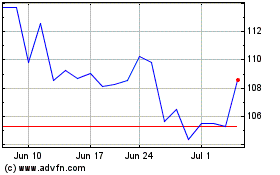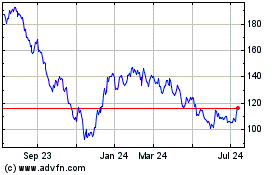Illumina Battles U.S., European Antitrust Enforcers on Grail Deal
May 28 2021 - 9:29AM
Dow Jones News
By Brent Kendall in Washington and Daniel Michaels in Brussels
Life-sciences company Illumina Inc. is facing a labyrinth of
antitrust hurdles on two continents as it seeks to save its planned
$7.1 billion acquisition of Grail Inc., which is developing an
early-stage cancer-detection test.
The deal, announced last September, could have important
ramifications for cancer care and the future of both companies. It
also has become something of a test for U.S. and European antitrust
enforcers as they focus more on whether acquisitions of leading
startups could slow innovation.
The U.S. Federal Trade Commission sued the companies in March to
block the deal. Since then, the European Union has added an element
of intrigue by invoking a new policy to claim a say on whether the
combination of the two U.S.-based companies moves forward.
A hearing Friday in San Diego could determine the course of U.S.
legal proceedings. Illumina has separately mounted a legal campaign
overseas contesting the EU's jurisdiction.
San Diego-based Illumina develops and sells next-generation
genetic-sequencing machines and the chemicals used in them. Grail,
based in Menlo Park, Calif., was founded by Illumina and spun off
in 2017. It has been developing liquid biopsy tests that examine
blood samples for genetic signs of cancer, a product that, if
successful, could have a significant impact in healthcare. Illumina
says buying Grail back would allow it to scale up operations and
expand access to the tests more quickly.
The FTC sees the deal differently, arguing it could harm
competition in the testing market. Other cancer-test developers --
Grail's competitors -- have no choice but to use Illumina's
instruments, the FTC alleged in its complaint, putting Illumina in
a position to impede their efforts and "cause substantial harm to
U.S. consumers, who would experience reduced innovation, as well as
potentially higher costs and reduced choice and quality for these
lifesaving products."
The commission voted 4-0 to bring the lawsuit, with Democrats
and Republicans supporting it.
Illumina denies the allegations and says it would offer
cancer-testing labs equal and fair access to sequencing. It has
pushed for quick legal proceedings in a San Diego federal court
that is set to begin considering on Aug. 9 whether to issue a
preliminary injunction blocking the deal. But the FTC says those
proceedings aren't appropriate right now, because the European
developments mean Illumina can't close the transaction anyway.
Illumina is urging the U.S. court to keep the case on track,
alleging the FTC is attempting to kill the deal through "procedural
gamesmanship" instead of trying to prove its case.
Any material delay in the schedule "would make it nearly
impossible for any court to make an informed decision regarding the
fate of what defendants believe is a pro-competitive lifesaving
transaction," lawyers for Illumina and Grail said in a Wednesday
court filing.
The terms of the transaction expire in September but can be
extended until December.
The FTC has a unique two-track system for challenging mergers.
It can bring a case in its in-house court system, a process
disliked by defendant companies, but the agency has to go to a
federal judge if it wants an injunction to block the deal in the
meantime.
The in-house trial on Illumina-Grail is set to begin Aug. 24,
and the FTC says those proceedings will continue. Illumina, like
past companies in its position, is most focused on the federal
court proceedings, hoping that a win there would undercut the FTC's
in-house trial, a process the company says is too slow.
The European Commission, the executive arm of the EU, wouldn't
have been able to review the Illumina transaction under its
traditional criteria that focus on issues related to revenue and
market share. Under a new policy announced in March, the commission
can now review a merger at individual countries' request on the
grounds that it would affect trade between states and be a
significant threat to competition.
Six countries -- France, Belgium, Greece, Iceland, the
Netherlands and Norway -- made such a request for the Illumina
deal, making it a test case for the new approach. The company has
filed suit in the General Court of the European Union, arguing
there is no European jurisdiction because Grail has no active
business activities there.
A European Commission spokeswoman said the EU antitrust enforcer
has asked Illumina to notify it formally of the transaction. She
declined to comment on Illumina's statements about the EU
review.
The change in European policy marks an effort by the commission
to adapt its antitrust enforcement to a fast-changing marketplace
where companies can expand with great speed, including through the
acquisition of pivotal smaller businesses, the commission has said.
Its March policy guidance changes nothing in the letter of the law
but fundamentally changes how it is interpreted.
Potential red flags for merger review now include almost any
deal done by a tech giant; almost any deal in a highly innovative
sector, such as pharmaceuticals; a deal that might trigger
complaints from third parties; and high-price acquisitions of
companies with little revenue.
"It raises a lot of questions and uncertainty," said Salomé
Cisnal de Ugarte, a partner at law firm Hogan Lovells in Brussels.
"It can affect every transaction."
Write to Brent Kendall at brent.kendall@wsj.com and Daniel
Michaels at daniel.michaels@wsj.com
(END) Dow Jones Newswires
May 28, 2021 09:14 ET (13:14 GMT)
Copyright (c) 2021 Dow Jones & Company, Inc.
Illumina (NASDAQ:ILMN)
Historical Stock Chart
From Mar 2024 to Apr 2024

Illumina (NASDAQ:ILMN)
Historical Stock Chart
From Apr 2023 to Apr 2024
